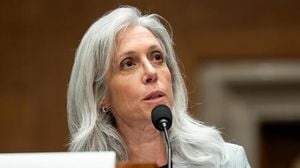A Holly Springs woman was sentenced to 52 months in jail for mail fraud linked to fraudulent claims for the IRS Employee Retention Credit (ERC), part of the COVID-19 relief efforts.
Lakisha Pearson, 48, owner of Unity Tax Express, was sentenced by U.S. District Court Judge Michael P. Mills on February 1, 2025, which reflects the serious stance taken by authorities against COVID-19 relief fraud. She also faces the repayment of $15,942,586.77 as restitution to the IRS.
According to the U.S. Attorney’s Office, Pearson used the internet to file false tax claims totaling nearly $47 million. These claims were presented as genuine applications for tax credits targeting businesses struggling during the pandemic.
The ERC was established under the Coronavirus Aid, Relief, and Economic Security (CARES) Act on March 27, 2020. The program aimed to provide financial support to help businesses retain employees during economic turmoil. Subsequent modifications to the ERC have been made through acts such as the Taxpayer Certainty and Disaster Tax Relief Act and the American Rescue Plan Act.
U.S. Attorney Clay Joyner expressed frustration over the misuse of these funds, stating, "Employee Retention Credits were tax credits... to line their own pockets during this emergency." This sentiment highlights the grave impact fraudsters like Pearson have had on the integrity of support programs intended to assist businesses during challenging times.
The fraudulent claims resulted in the IRS issuing Treasury checks to claimants who believed they were receiving government grants, unaware of Pearson's scheme to file tax returns under their names. The investigation revealed her not only filed fraudulent tax credit claims but also received kickbacks from the individuals whose identities she exploited.
The IRS stepped up its investigation efforts to crack down on tax fraud during the pandemic, leading to this significant conviction. "Unscrupulous tax preparers are put on notice... there is a price to pay for using their trusted position to defraud the federal government," said Assistant Special Agent Lisa Fontanette of the IRS Criminal Investigation Atlanta Field Office.
Authorities are dedicated to pursuing and holding accountable all individuals who defraud the government, as evidenced by Pearson's case. Her sentencing serves as a strong reminder to potential fraudsters of the legal repercussions they may face.
Interestingly, Pearson’s fraudulent activities came to light during the investigation of another scheme involving Payroll Protection loans. She awaits sentencing for those fraudulent actions as well, which could add to her punishment.
The case of Lakisha Pearson serves as both a cautionary tale and reflection of the urgent need for vigilance among tax filers. With the IRS actively pursuing those committing fraud, Americans are reminded to conduct thorough research when choosing tax preparers and to remain aware of the signs of fraudulent activities.
Given the financial impact of the COVID-19 pandemic, the Employee Retention Credit was intended to provide relief; unfortunately, cases like Pearson's demonstrate the need for continued investigations and stronger safeguards to protect taxpayer dollars.
While the fraud scheme inflicted considerable damage, the legal system’s response highlights the commitment of federal authorities to preserve the integrity of emergency relief programs. The outcome of this case may deter future attempts at fraud against government funds aimed at supporting those most affected by the pandemic’s economic fallout.



